Did ULTRA win the Second World War?
The Effect of ULTRA on the Allied Victory in Europe, the Battle of the Atlantic, and Operation Overlord
The decryption of the German Enigma code by the Ultra program at Bletchley Park during the Second World War was one of the biggest intelligence coups in history. Ultra allowed the Allied powers unprecedented access to German communications and intentions. The question remains though, what effect did this have on the outcome of the war? While Ultra certainly was not the only reason the Allies won the war in Europe, it was an asset in ensuring a speedy end to the war. The German failure to recognize that their messages were being read saved countless lives and shortened the war by months if not years. This is not immediately clear for a few different reasons.
 Enigma Machine. From Alessandro Nassiri - Museo della Scienza e della Tecnologia “Leonardo da Vinci”, CC BY-SA 4.0
Enigma Machine. From Alessandro Nassiri - Museo della Scienza e della Tecnologia “Leonardo da Vinci”, CC BY-SA 4.0
First, many have pointed to the massive security precautions put in place to keep Ultra secret as a hindrance to the actual value of Ultra. Second, in the immediate years after the war there was no apparent effect of Ultra since Ultra was not public knowledge until the 1970s. As such, there remain many sources from the war years which make no mention of Ultra, complicating efforts to attempt and assess it’s usefulness. However, historians have gradually connected more and more crucial Allied decisions to Ultra, particularly in relation to the Battle of the Atlantic, the Mediterranean theatre, and the Allied bombing campaign over Europe. As time goes on, the vital contribution of Ultra to the Allied war effort becomes more clear, and it becomes apparent that Ultra greatly speeded the end of the war.
Despite this, there is a school of thought that contends that Allied efforts to keep Ultra secret curtailed its use. If this is true the actual effect of Ultra on the outcome of the war would be negligible. The principal example that many call to mind is the bombing of Coventry in 1940. In 1974, shortly after Ultra was made public, it was claimed “Ultra provided five hours warning of an attack” on Coventry.1 In reality though, “Ultra gave advance notice of a large scale aerial assault and of the radio messages which would signal its imminence. It made no further contribution.”2 To make matters worse, at least one popular history spreads this rumour, recording that the bombing of Coventry was “allowed to happen” to avoid “exposing their [the British] knowledge” of Ultra.3
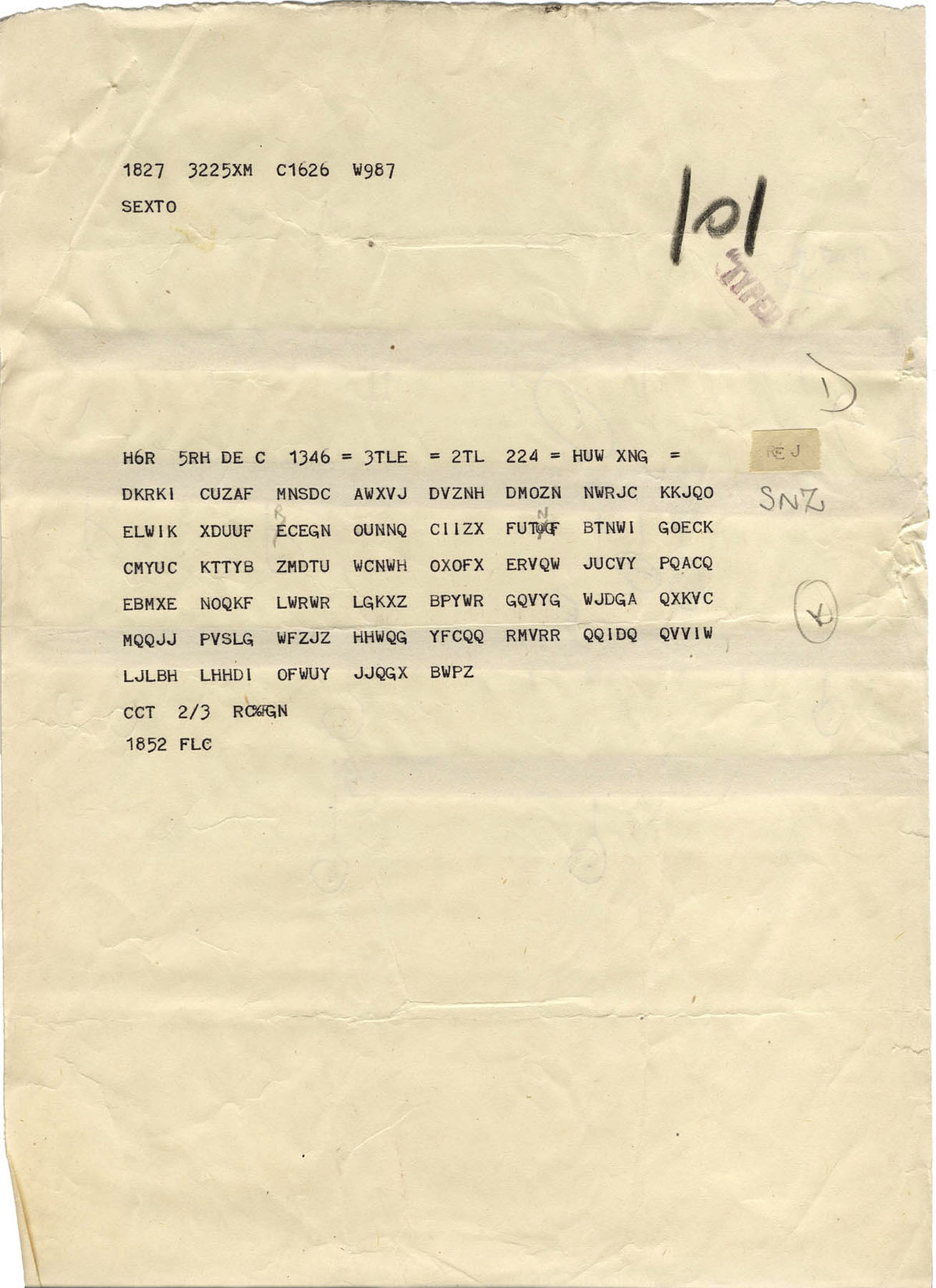 An ULTRA intercept. From United States Air Force Public Domain
An ULTRA intercept. From United States Air Force Public Domain
Given the evidence, the story of the bombing is clearly more nuanced than this, and a British desire to protect Ultra was not the reason it happened. The bombing of Coventry was not exactly a crucial moment in the Second World War (save if one was a resident of Coventry), but this is perhaps the best known ‘example’ of Ultra intelligence not being used in order to protect the program. As in many examples of this, the true story is not that simple. So why then do these rumours persist?
Perhaps it is due to the massive effort that the Allies put in to keeping Ultra secret, and German refusal to believe that Enigma was vulnerable. The Germans would never realize that Enigma had been broken, ending the Second World War “certain of one thing: Enigma machine ciphers had kept their communications secure.”4 It would seem then that Allied precautions in dealing with Ultra intelligence had paid off, and hence Ultra played less of a part in the Allied victory, as it would seem that any meaningful use of Ultra intelligence would have attracted scrutiny. Again, like the bombing of Coventry, the story is more nuanced than that.
The Germans believed in the mathematical superiority of Enigma. They were not exactly wrong here either. If the Enigma system were to be “used correctly and judiciously,” it “[would] challenge even today’s computers.”5 The simple fact is though that the Germans were sloppy. Enigma was broken “because of the humans who operated the machine.”6 Practices like repeating daily greetings would give British codebreakers “an end run around Enigma’s complex calculations.”7 The Germans did not envision “creative, nonlinear” attacks like these, and their belief in mathematics over real life would also be the reason that they never realized that Enigma had been broken.8
Rather than the Allies being especially good at covering their tracks, the Germans relied so much on the theoretical mathematics that they were unable to believe that their messages were being read. In fact, Allied operations were rather obvious, and “the Germans admitted on several occasions that their enemy was somehow locating U-boats, bombing the most vital supplies bound for North Africa and otherwise demonstrating that it had crucial information on the Germans’ situation and intentions.”9
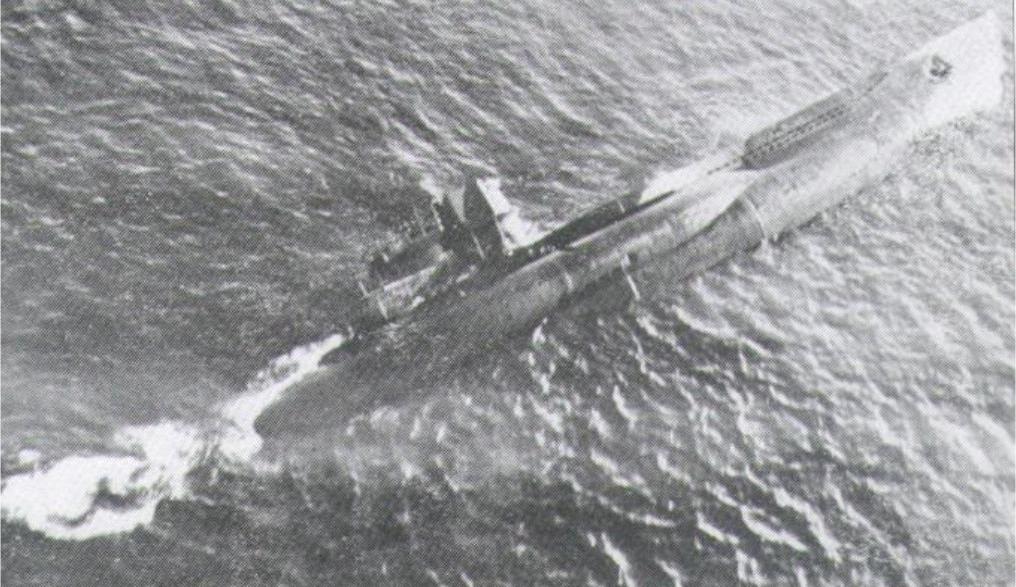 U-617 aground off Morocco after an air attack on Sept 12, 1943. From Royal Navy Public Domain
U-617 aground off Morocco after an air attack on Sept 12, 1943. From Royal Navy Public Domain
Throughout their many investigations into this phenomenon, the Germans “focused on countering the possibilities of physical compromise and then attempted to eliminate the possibility of Enigma’s responsibility.”10 Every investigation involved the Germans “utterly refusing to credit that Enigma could be decrypted” even in the face of “inexplicable cases of British advance knowledge of their intentions.”11 German investigations never used real radio traffic to test Enigma, instead relying on artificial conditions which could not reconstruct vulnerabilities, and “they focused on the statistics of cryptology.”12 13
This is not to say that the Allies did not take extraordinary measures to protect the source of their intelligence. They did, and even the Soviets, who had no official knowledge of Ultra, “agreed to make certain that they took special precautions to protect the source of this ‘special intelligence’.”14 Further, Allied precautions may have been the reason that the Germans refused to consider that Enigma had been broken, even when confronted with evidence. The point of all this is to establish that these precautions were not the sole reason that the cracking of Enigma went undetected. Moreover, the evidence the Germans were provided with (even if they did not realize what was happening) speaks to the very real way in which Ultra intelligence was employed throughout all theatres of the war, which will be detailed more later on.
This employment of Ultra intelligence would greatly assist Allied planning of operations. The German failure to recognize that Enigma had been broken would allow a constant forwarding of Axis intentions, movements and planning directly to the Allies. The employment of this intelligence certainly had an effect on the timeline of the end of the war. Without German arrogance, none of this would have been possible.
While the breaking of Enigma would go undetected, there is some credence to the theory that the precautions set up to protect Ultra may have impeded operations. The way Ultra intelligence was disseminated may have affected the degree to which it was acted on. In many cases, when Ultra intelligence was passed along to operational commanders, “recipients of the intelligence were not always aware of its source.”15 As a result, some commanders may have distrusted the intelligence since they believed it came from a human source.16 The protections of Ultra affecting operations is especially apparent in relation to the dissemination of Ultra intelligence to Bomber Command during the Allied strategic bombing campaign over Europe. In this area, Ultra intelligence was especially time sensitive, and “any delay in operational intelligence may well mean that the information [was] reduce[d] in value or may even become valueless.”17
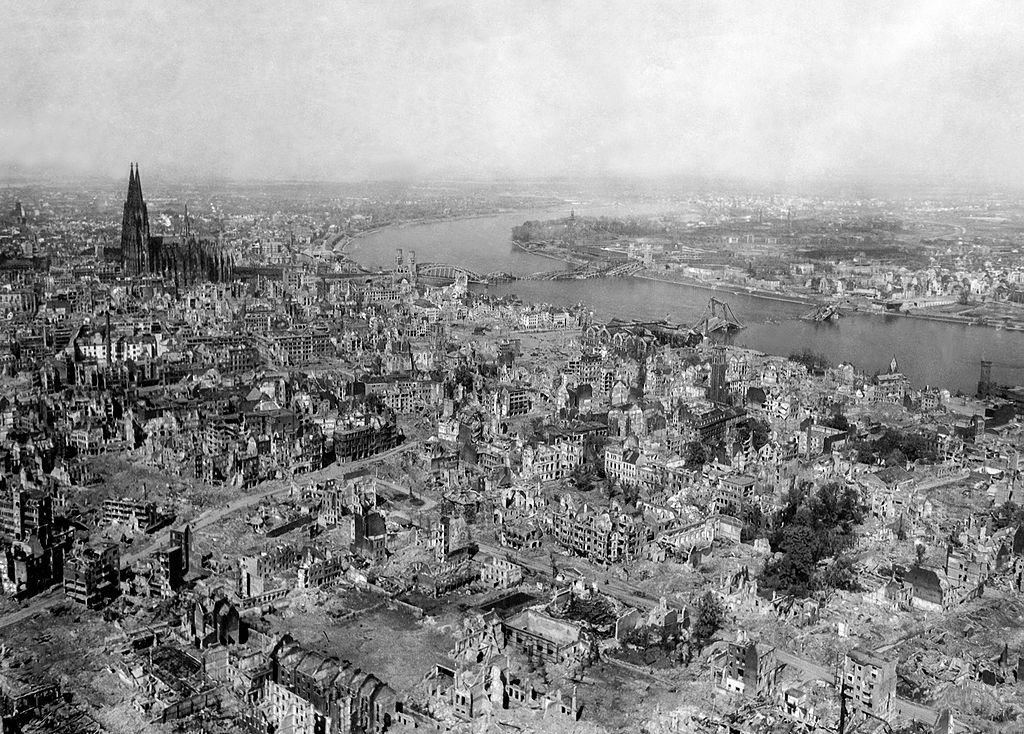 Cologne in 1945 after extensive Allied bombing. From U.S. Department of Defense, Department of the Army, Office of the Chief Signal Officer Public Domain
Cologne in 1945 after extensive Allied bombing. From U.S. Department of Defense, Department of the Army, Office of the Chief Signal Officer Public Domain
To make matters worse, the route between Bletchley Park and Bomber command was “impossibly slow.”18 It would seem that structural problems like these would nullify the effect of Ultra on the end of the war. The Allies had the intelligence, but their arcane system for disseminating it made it almost useless by the time it was taken into account when planning operations. Despite these obstacles, Ultra was still able to have a noticeable effect on the operations of Bomber Command, being “the basis for informed intelligence to support the planning and direction of tactical air operations.”19
Ultra intercepts that informed on the status of German repairs to damaged airfields would enable “an intensive, well-orchestrated campaign that destroyed the Germans’ airfield base structure near the English Channel and invasion beaches” during the lead up to Operation Overlord.20 21 This is just one solitary example of an area where Ultra may not have been used to its full potential, but still had a real effect on the conduct of operations. So, even if Allied precautions were over the top, Ultra still played a part in the planning of operations which had an effect on the timeliness of the outcome of the war.
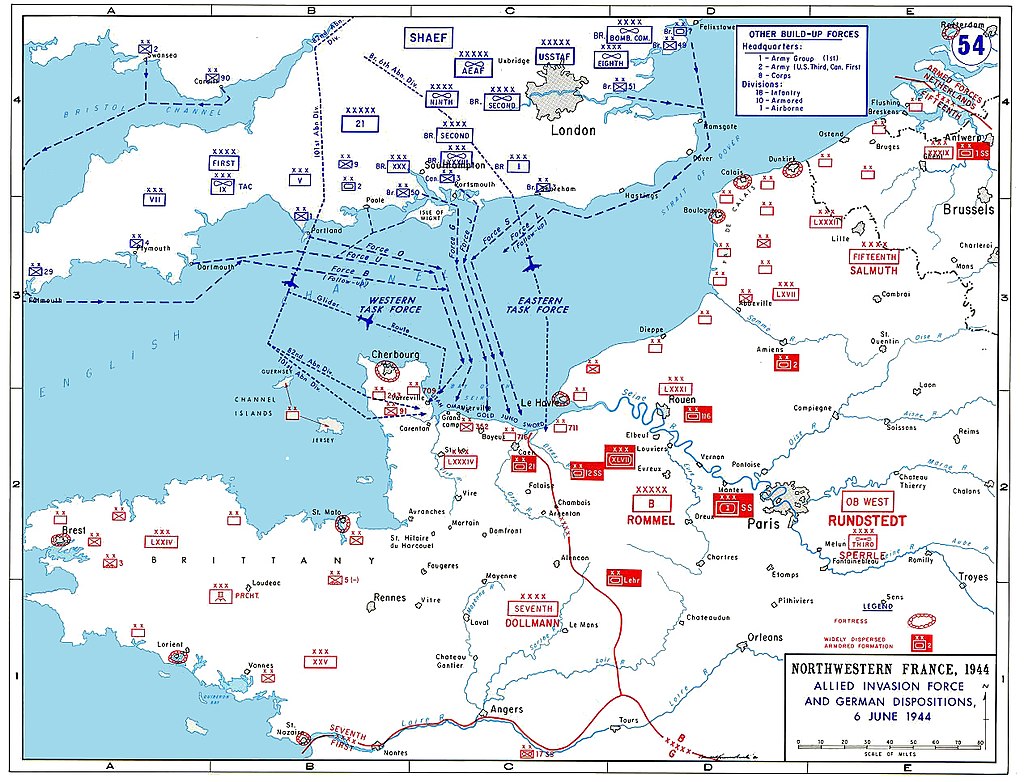 Assault routes for Operation Overlord. From United States Military Academy Public Domain
Assault routes for Operation Overlord. From United States Military Academy Public Domain
There are a few particular ares where this effect can be seen easiest, despite all precautions taken to protect it. During the Battle of the Atlantic, Ultra would play a critical role in helping to locate U-boats and inform on German intentions. During the early years of the war, U-boats threatened to cut off critical supply lines which kept Britain in the war. There were several methods for locating U-boats in the Atlantic, not all of which involved cryptography, such as direction finding.22 However, the most effective weapon against U-boats was intercepted and decrypted communications.
Reading the private communications between the German naval command and U-Boat commanders gave “the Allies ample warning of how and where the submarines were to be deployed.”23 The version of the Enigma cipher used by the German navy would first be broken in 1941.24 Following the breaking of Enigma, shipping losses would “peak in May with the loss of well in excess of 300, 000 tons … but from then on was to decline, with only June, September and October showing figures significantly in excess of 100, 000 tons.”25 Shortly after the American entry into the war, the Germans would upgrade Enigma, “temporarily blinding the British to submarine movements in the Atlantic.”26 27 It was during this period that Allied shipping losses peaked, but “following the return of Ultra to the scene” they sank to “lower proportions than ever before.”28 29
The war in the Atlantic was thus greatly affected by the availability of Ultra intelligence, and without it, shipping losses may have reached such a high level that Britain may have starved out of the war. Moreover, if the U-boat threat had not been contained as it was, the invasion of France during Operation Overlord would have been “infinitely more difficult” if the U-boat threat had delayed it, due to the completion of the Atlantic Wall and German production of more defences.30 31 Without treading too far into alternate history, it is easy to see how a snowball effect could have occurred. Any delay in the Normandy landings would reduce their chance of success, and even if they succeeded, the battle for France would have been far longer if Germany had been given even more time to prepare.
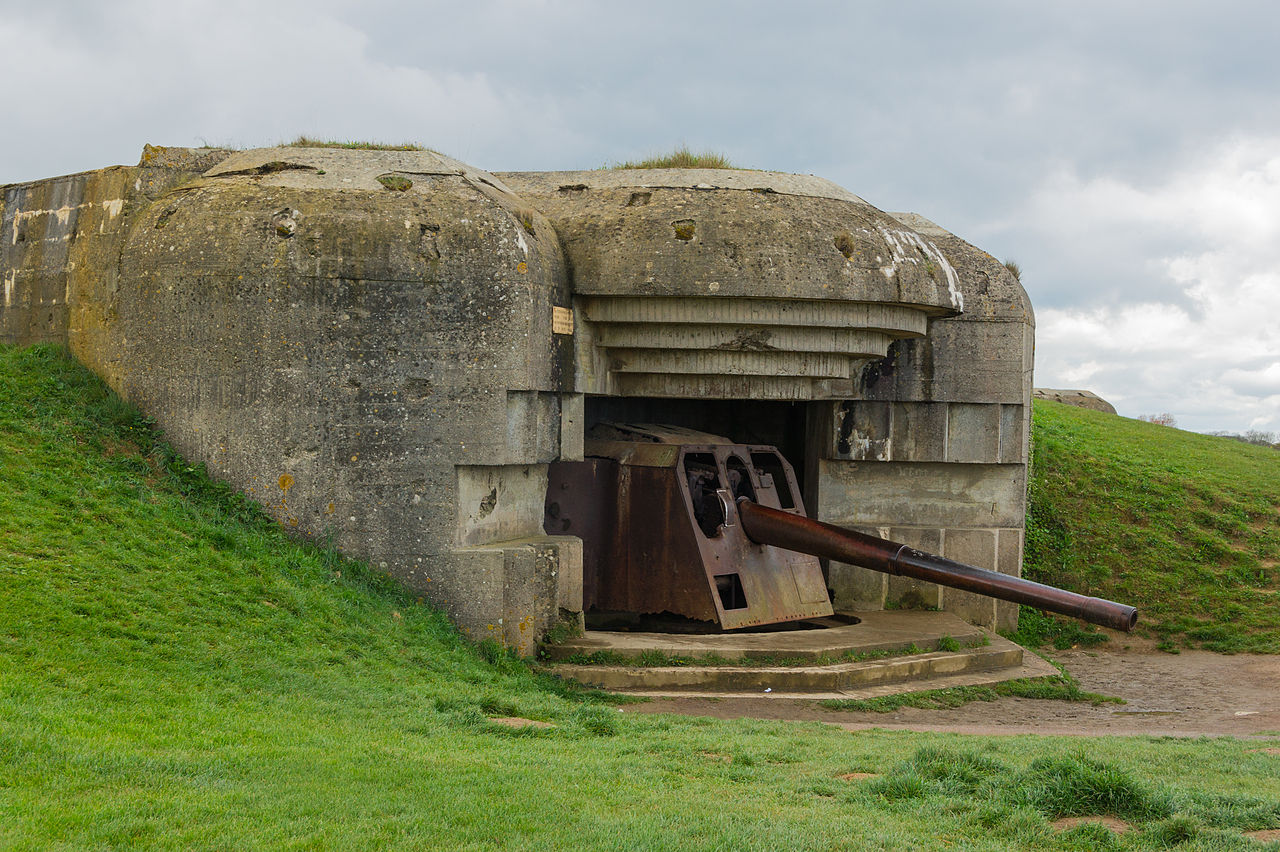 The Longues-sur-Mer battery in Normandy, on the Atlantic Wall. From Wikipedia user Jebulon Own work, CC0
The Longues-sur-Mer battery in Normandy, on the Atlantic Wall. From Wikipedia user Jebulon Own work, CC0
The Battle of the Atlantic is just one example of the dramatic ways in which Ultra effected operations. Ultra would also be important in other theatres, such as the Mediterranean. Here Ultra decrypts of German and Italian codes would help the Allies win the war in Africa “chiefly by killing off his [Erwin Rommel’s] seaborne supplies.”32 Like in the Atlantic, “Ultra provided a wealth of tactical intelligence on Axis naval movements” in the Mediterranean.33 In other theatres of the war the story would be much the same. Ultra provided real time, actionable intelligence which directly affected operations. Again, it is hard to speculate what would have happened without Ultra, but it doesn’t take much imagination to see the war dragging on far past May 8, 1945.
While with modern hindsight it may appear to be obvious that the war would have continued much longer had it not been for Ultra, this was not clear immediately after the war. As mentioned earlier, Ultra would not become public knowledge until 1974.34 By then, many histories and war stories had already been put to print. Even after Ultra was public knowledge, many of the decrypts were not made immediately available. Ralph Bennett, writing in 1994 in Behind the Battle, notes that “nearly 100, 000” decrypts had been released, “[constituting] almost all that is known about the intelligence content of Ultra.”35 Bennett notes that some events are easy to follow given the availability of decrypts, while others remained (in 1994) shrouded in mystery.36
This is the biggest problem that historians of Ultra faced, and may continue to face, given that Western intelligence agencies are not exactly willing to have their records audited. As well, “it appears to be practically common knowledge among surviving Ultra operatives that a good deal [of the information about Ultra] was destroyed in 1945 or 1946.”37 Given these factors, it is extremely hard to pinpoint the real effect of Ultra on the outcome of the war because evidence the entire picture is impossible to know.
There is some hope though. As more evidence becomes available, things become more clear. The overarching trend is that when new information surfaces, it point to Ultra as a larger and larger part of the planning of Allied operations. Take Operation Overlord for example. This has been previously discussed in relation to the Battle of the Atlantic, wherein Ultra helping to destroy U-boats in the Atlantic can be directly correlated to the success and timing of the landings on June 6, 1944. In addition to this, Ultra was also used as a vital tool in ensuring the success of the Operation Fortitude, the Allied deception operation before D-Day.38
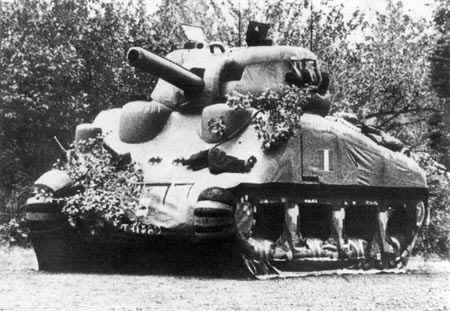 A dummy Sherman tank built for Operation Fortitude. From United States Army Public Domain
A dummy Sherman tank built for Operation Fortitude. From United States Army Public Domain
This contribution was of course not known until after Ultra became public. However, even in 1988, a full fourteen years after Ultra had entered into the public consciousness, the official British history of the war made only token reference of the role of Ultra during Operation Fortitude.39 Ralph Bennett, in Intelligence Investigations, states that in “500 pages”, the British official history of the war “[did] not provide a single example of the link” between Ultra and Fortitude.40 As a result of this, “a vital part of the explanation for OVERLORD’s success is hidden from view.”41 Bennett goes on to discuss in detail the Ultra decrypts which effected Operation Fortitude.42 This analysis further strengthens the links between the planning and timing of Operation Overlord with Ultra. The Normandy landings were perhaps one of the most crucial operations of the war, with a direct effect on the timeliness of the German surrender.
As more information is surfaced and painstakingly categorized by historians, trends like this will continue. The reveal of Ultra “[seemed] to demand immediate and wholesale revision of historical assumptions about virtually all that determined the course of World War II in the Atlantic sector.”43 This may have been a bit of a drastic reaction, but it is clear that “intensive documentary study of Ultra” is needed to “provide answers to an infinity of questions.”44 Until this study is complete, and it likely never will be, the true effect that Ultra had on the end of the war will be impossible to gauge fully. What is not in doubt is that Ultra did have a direct effect on operations throughout the war. Without Ultra, many crucial operations may not have been possible to carry out in the same time frame.
Given the information currently available, it is clear that the Germans never realizing that Enigma had been broken granted the Allies a huge advantage in planning operations which had a direct effect on the outcome of the war. Nearly every operation has some Ultra component, from the Battle of the Atlantic to the struggle for control of North Africa. With all these uses of Ultra, it should have been obvious to the Germans that their message were being read. Their reliance on the mathematical complexity of Enigma and human error amounts to arrogance in believing that their system was completely secure. It was this arrogance which allowed Ultra to be so successful in so many operations. The longtime secrecy of Ultra is an obstacle to study.
Even with the clouds that still hang over some parts of Ultra, the operational value of it can be easily seen. Despite being kept under wraps for so long, Ultra was a decisive factor in the Allied victory in the Second World War. It may not have been the one reason for the Allied victory, but it sped it up. Ultra allowed for Allied planners to know both their own intentions and that of the enemy, acting as the dungeon master and as a player. No war can last long if one side knows how to win.
Bennett, Ralph Francis. 1996. Intelligence investigations: how ultra changed history. Portland, OR: F. Cass.
Bryden, John. 1993. Best-kept secret: Canadian secret intelligence in the Second World War. Toronto, ON: Lester Pub
Deutsch, H. C. (1977). THE HISTORICAL IMPACT OF REVEALING THE ULTRA SECRET. Parameters, 7(3), 16 - 32
Evans, N. E. (1976). Air intelligence and the Coventry raid. Rusi, 121(3), 66.
Hinsley, Harry. 1996. “THE COUNTERFACTUAL HISTORY OF NO ULTRA.” Cryptologia 20 (4): 308-324
Ratcliff, R. A. 2003. “HOW STATISTICS LED THE GERMANS TO BELIEVE ENIGMA SECURE AND WHY THEY WERE WRONG: NEGLECTING THE PRACTICAL MATHEMATICS OF CIPHER MACHINES.” Cryptologia 27 (2): 119-131
Ratcliff, R. A. 1999. “Searching for Security: The German Investigations into Enigma’s Security.” Intelligence and National Security 14 (1): 146-167
Robson, Maria. 2014. “Signals in the Sea: The Value of Ultra Intelligence in the Mediterranean in World War II.” Journal of Intelligence History 13 (2): 176-188
Smith, Bradley F. 1988. “Sharing Ultra in World War II.” International Journal of Intelligence and CounterIntelligence 2 (1): 59-72.
Stubbington, John. 2010. “Kept in the dark : the denial to Bomber Command of vital ULTRA and other intelligence information during World War II”. Barnsley: Pen & Sword Aviation
Uncle John’s Bathroom Reader Plunges Into History. 2001. Ashland, Or: Bathroom Readers’ Hysterical Society.
-
N.E. Evans, 1976, “Air intelligence and the Coventry raid, ” Rusi, 121(3), p. 66. ↩
-
Ibid., p. 73 ↩
-
“Uncle John’s Bathroom Reader Plunges Into History” (Ashland, Or: Bathroom Readers’ Hysterical Society, 2001) p. 71 ↩
-
R. A. Ratcliff, 2003. “HOW STATISTICS LED THE GERMANS TO BELIEVE ENIGMA SECURE AND WHY THEY WERE WRONG: NEGLECTING THE PRACTICAL MATHEMATICS OF CIPHER MACHINES.” Cryptologia 27 (2): p. 119 ↩
-
Ibid., p.120 ↩
-
Ibid., p. 120 ↩
-
Ibid., p.129 ↩
-
Ibid., p. 129 ↩
-
R. A. Ratcliff, 1999, “Searching for Security: The German Investigations into Enigma’s Security.” Intelligence and National Security 14 (1): p. 147 ↩
-
Ibid., p. 148 ↩
-
Ralph F. Bennett, “Behind the battle: intelligence in the war with Germany, 1939-45”.(London: Pimlico, 1999) p. 185 ↩
-
R. A. Ratcliff, 2003. “HOW STATISTICS LED THE GERMANS TO BELIEVE ENIGMA SECURE AND WHY THEY WERE WRONG: NEGLECTING THE PRACTICAL MATHEMATICS OF CIPHER MACHINES.” Cryptologia 27 (2): p. 129 ↩
-
Ibid., p. 129 ↩
-
Bradley F. Smith, 1988. “Sharing Ultra in World War II.” International Journal of Intelligence and CounterIntelligence 2 (1): p. 60 ↩
-
Maria Robson, 2014. “Signals in the Sea: The Value of Ultra Intelligence in the Mediterranean in World War II.” Journal of Intelligence History 13 (2): p. 181 ↩
-
Ibid., p. 181 ↩
-
John Stubbington, “Kept in the dark : the denial to Bomber Command of vital ULTRA and other intelligence information during World War II”. (Barnsley: Pen & Sword Aviation, 2010) p. 273 ↩
-
Ibid., p. 274 ↩
-
Ibid., p. 275 ↩
-
Ibid., p. 274 -275 ↩
-
Ibid., p. 275 ↩
-
John Bryden, “Best-kept secret: Canadian secret intelligence in the Second World War.” (Toronto, ON: Lester Pub, 1993) p. 6-7 ↩
-
Ibid., p. 180 ↩
-
Ibid., p. 72 ↩
-
Decoding history p. 150 ↩
-
John Bryden, “Best-kept secret: Canadian secret intelligence in the Second World War.” (Toronto, ON: Lester Pub, 1993) p. 126 ↩
-
Ibid., p.126 ↩
-
Harry Hinsley, 1996. “THE COUNTERFACTUAL HISTORY OF NO ULTRA.” Cryptologia 20 (4): p. 318 ↩
-
Ibid., p. 318 ↩
-
Ibid., p.319 ↩
-
Ibid., p. 319 ↩
-
Ibid., p. 317 ↩
-
Maria Robson, 2014. “Signals in the Sea: The Value of Ultra Intelligence in the Mediterranean in World War II.” Journal of Intelligence History 13 (2): p. 178 ↩
-
H.C. Deutsch, 1977, THE HISTORICAL IMPACT OF REVEALING THE ULTRA SECRET. Parameters, 7(3) p. 29 ↩
-
Ralph F. Bennett, “Behind the battle: intelligence in the war with Germany, 1939-45”.(London: Pimlico, 1999) p. 290 ↩
-
Ibid., p. 290 - 291 ↩
-
H.C. Deutsch, 1977, THE HISTORICAL IMPACT OF REVEALING THE ULTRA SECRET. Parameters, 7(3) p. 29 ↩
-
Ralph F. Bennett, “Intelligence investigations: how ultra changed history” (Portland, OR: F. Cass, 1996) p. 173: “Ultra was central to Fortitudes conception and execution, and provided a continuous monitor on German reactions to it’” ↩
-
Ibid., p. 174 ↩
-
Ibid., p. 174 ↩
-
Ibid., p. 174 ↩
-
Ultra and Operation Fortitude is the subject of an entire article (p. 170 - 194) in Intelligence Investigations, which is a collection of Ralph Bennett’s various papers ↩
-
H.C. Deutsch, 1977, THE HISTORICAL IMPACT OF REVEALING THE ULTRA SECRET. Parameters, 7(3) p.16 ↩
-
Ibid., p. 30 - 31 ↩
